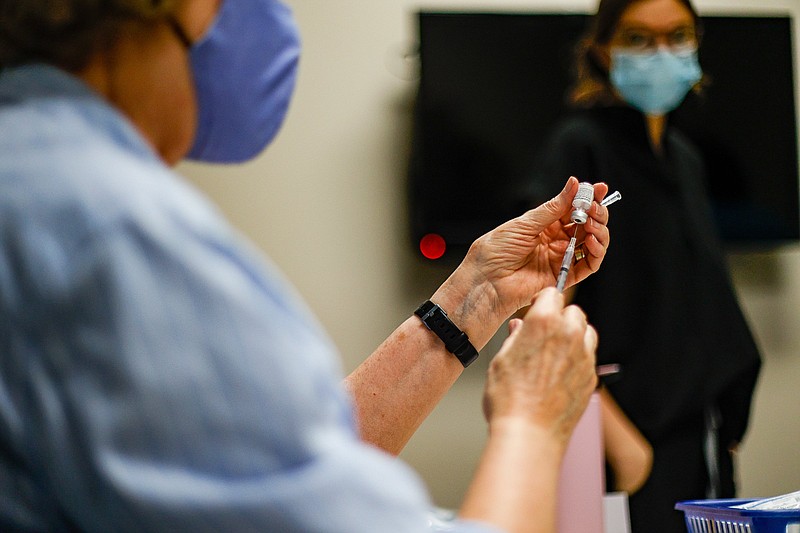As the omicron variant drives an increasing number of COVID-19 infections in fully vaccinated people, a new data dashboard from the Tennessee Department of Health offers the most detailed picture of these so-called "breakthrough cases" in the state to date.
In the past week, an average of 35 new COVID-19 cases per 100,000 fully vaccinated Tennesseans occurred compared to a weekly average of eight new cases per 100,000 fully vaccinated Tennesseans a month ago.
By comparison, during those same time frames, Tennesseans who are not fully vaccinated saw an average of 68 COVID-19 cases per 100,000 residents compared to a weekly average of 24 a month ago.
The dashboard notes recent cases that have occurred within roughly 10 days may not yet be reflected in the data, and health officials said a significant rise in at-home testing is also causing many positive cases to go unreported.
Several factors aside from omicron's ability to better evade immunity from vaccinations compared to prior variants are likely influencing the rise in breakthrough case reports.
The U.S. Centers for Disease Control and Prevention now recommends boosters for everyone age 18 and up who is at least six months out from completing their primary COVID-19 vaccination series, and less than half of vaccinated Tennesseans have gotten booster shots, according to department of health data.
"Data from South Africa and the United Kingdom demonstrate that vaccine effectiveness against [omicron] infection for two doses of [either the Pfizer or Moderna] vaccine is approximately 35%. A COVID-19 vaccine booster dose restores vaccine effectiveness against infection to 75%," according to a statement from the CDC released Monday.
While not an official recommendation, the CDC strongly encourages those who are age 16 and up and past the six-month window of receiving their second vaccine dose to get a booster.
However, for the purpose of reporting breakthrough infections, the Tennessee Department of Health and the CDC still consider someone to be fully vaccinated two weeks after their second dose of either Pfizer or Moderna's two-shot series or two weeks after the single-dose J&J vaccine.
Breakthrough cases are also more likely in general during periods of high community spread, which is the case currently in Tennessee and much of the nation.
"The longer it's been since you had your primary series of vaccination, the less immune protection you have, which makes it really, really important to get a booster shot," Tennessee Health Commissioner Dr. Lisa Piercey said during a news briefing last week. "But we do know that vaccination - just even the primary series - does appear to protect you against those severe outcomes, like hospitalization and death."
In her most recent weekly newsletter, Dr. Lisa Smith, medical director for COVID-19 services at Chattanooga-based One to One Health, said the phrase "breakthrough infection" is a bit of a misnomer in that it implies that a vaccine failed.
"Infection in a vaccinated individual does not mean that vaccines don't work. Vaccines are preventives, not cures. One can still contract COVID-19 once vaccinated. As long as vaccination is preventing you from facing severe disease and worse, it [is] doing exactly what it was designed to do," Smith said.
Smith called it a "very lofty expectation" for vaccines to prevent every mild infection. Although it's possible that one day we will have COVID-19 vaccines that provide what's called "sterilizing" immunity, that's much more difficult to achieve, she said.
Contact Elizabeth Fite at efite@timesfreepress.com or follow her on Twitter @ecfite.
